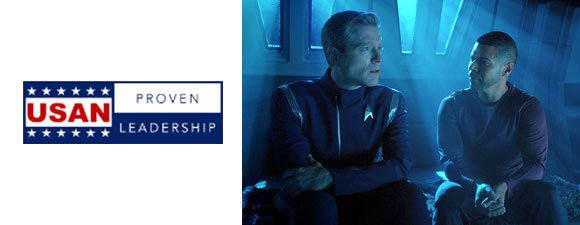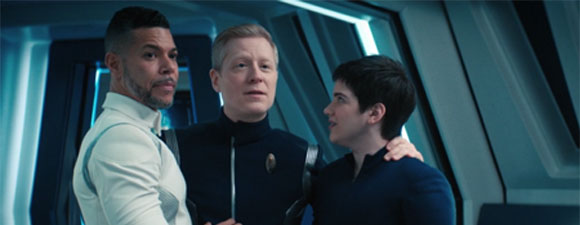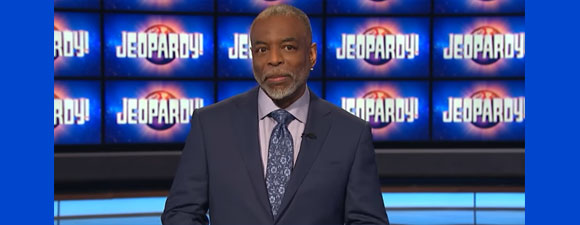Moore Misses Trek
2 min read
Fans attending Destination Star Trek London next weekend will see Star Trek Writer/Producer Ronald D. Moore as well as all five Star Trek television show captains.
Moore spoke about his time working on Star Trek: The Next Generation and Deep Space Nine; and revealed how he feels about the Klingons, and what he wanted to do when he first joined Deep Space Nine.
Although he could never get into the Klingon language, Moore was a fan of the feisty Klingons. “Oh, the language I never even pretended to know! I could say ‘Kapla!’ because they’d said it in Star Trek III,” said Moore. “Mark Okran‘s Klingon Dictionary sat on my desk throughout my tenure and I would go to it to pick up words or phrases, but I couldn’t make head nor tails of the syntax or the grammar and I never honestly tried! Most of the time I would be writing Klingon language more on just rhythm and sound rather than actually paying attention to the rules.
“I feel a great connection to [the Klingons]. I didn’t invent them; I just came along an embroidered what had come before me. I’m just someone in a chain of people that contributed to that myth.”
Moore joined Deep Space Nine after it had been established, in the third season. “I just wanted it to grow and do something different,” he said. “I’d done five years on the Enterprise and the challenge of writing Star Trek in a completely different format was exciting. I’d worked with Ira [Steven Behr] on Star Trek when I first worked on Trek and it was good to work with him again. It was just an exciting opportunity to play with these different characters.”
The Star Trek characters grew on Moore and he still misses them. “The things I miss most about those days is having this connection with those characters,” he explained. “I don’t get to sit in a room and talk about Worf anymore or dig into Picard’s psychology or explore his relationship with Data. When you’re working on a show like that, you talk about these people so much and you get intimately involved in their entire life history, so they become very real people to you, and then suddenly they’re gone.”
Moore is currently working on an adaption of the Outlander series for TV.







What episode are the Klingons from?
Kind of hard to tell, but I think it might be an episode of Enterprise. The crew tries to help some miners defend themselves from Klingon raiders.
Errand of Mercy?
Marauders season 2 episode 6 of enterprise
What happened with Moore’s purported Wild Wild West series? I was kind of looking forward to that. What a fickle business,…Hollywood.
It’s not happening. They decided they didn’t want to do any Westerns.
After Moore helped contribute to the downfall of the Star Trek franchise with that 1994 abomination known as Generations, I wouldn’t trust him with anything Star Trek related. It was bad enough that his script dealt with the less than graceful killing of Captain James Tiberius Kirk. It was worse when he tarnished the memory of Battlestar Galactica by creating that terrible remake.
Ronald D. Moore must be Fred Freiberger reincarnated!
And I miss Ron Moore. Too bad Caprica crashed and burned, but I think it was unorthodox series and I really disliked the characters. His work on BSG was fantastic, despite what I think ranks among the most odious final episodes in a TV series. Here’s hoping he finds his footing again. Moreover, here’s hoping Paramount realizes that it’s been too long without a Trek series in production and it’s time to put an all-new team together to create the next chapter of the TV franchise.
Well, if you want to get technical you could argue that the first time the Federation encounters the Klingons is the first episode of Enterprise, with the Klingon courier. I struggle, though, because I’m still stuck in the outdated perception that the Klingons originated in the TOS series, even though they were retconned as a genetic aberration. Stuck in the past I am.
As I said, what a fickle biz. Shame. And Wild Wild West wasn’t really a western in the real sense of the word. It was James Bond on horses.
Both of those statements is entirely true. Klingons originated as a fictional species on TOS in 1966… The Federation, however, within continuity, had always met Klingons ages before the run of TOS, at about the time of Enterprise… So, when Enterprise shows the first encounter to be the courier, well, that contradicts nothing. The Federation always did meet the Klingons at this time. You’re conflating fiction and reality… yes, in reality things changed… within the fiction? Not so much, as nothing was ever remotely violated with them.
Hehe no, I never argued that there was anything wrong with continuity. It’s just that in my mind, the Klingons in the TOS series were the “true” Klingons because they were the originals. Not that I didn’t think the bumpy-head makeup that made its appearance in TMP wasn’t cool. As I said, I am just stuck in the past even though I know better.
Moore was a fine Trek writer.
By the way, it’s Mark Okrand.
More than that! Sometimes it was Outer Limits with horses. Aliens from Venus, invisibility and super speed potions, all manner of bizarre cross-genre juxtapositions. It also had a deft, tongue-in-cheek tone. It’s roots steampunk and secret history. Wild Wild West really deserves a quality reboot.
Having “modern” Klingons (with TNG head appliances, no less) in Enterprise was a serious gaffe, because now the writers had to deal with Klingons not only gaining ridges as a race (and as individulas!) at some point, but having ridges, losing them, and gaining them back again. Serious lack of foresight involved there. However I thought the solution the Reeves-Stevenses came up with was a quite good unpretzeling.
The new BSG was really good. There are some flaws, but, well, Star Trek has its fair share of those too. Of the TNG films, Generations was the truest to the show. First Contact was a close second, but ultimately focused too heavily on being an action movie (not to mention it’s horrible treatment of characters who weren’t Picard and Data). Insurrection and Nemesis had absolutely no respect for the fans of the show, and so I have no respect for them.
I’m afraid I have to dispute the claim about Generations being the truest to the show. The movie, in all honesty, was just an excuse to bring Kirk and Picard together. The only good things about the film were the following:
1. The Enterprise-B segment
2. Malcolm McDowell
3. The deaths of Lursa and B’Tor
4. John Putch, Whoopi Goldberg, Alan Ruck, and Jenette Goldstein
5. The introduction of Hikaru Sulu’s daughter
6. A glimpse into Kirk’s past concerning Butler and Antonia
The rest….well, the less said the better.
First Contact was definitely the best and ONLY the best of the NG film entries. The only two things wrong about that 1996 Blockbuster were the writers – Ronald Moore and Brannon Braga. I guess they were trying to make amends for the misfire that Generations was and still is.
Being of the old school, the remake of BSG was just awful in every sense of the word. If nothing else, it was a perversion of the original space epic and a reflection of the post 9/11 world. Something that audiences really did not need a reminder of. Let alone the fact that the remake was also a reflection of all of the turmoil in the world that is going on right now.
To each his own.
By the way, I enjoyed reading The Klingon Dictionary. It was well-written and well researched. My compliments to you, sir, for an excellent job. I still have my copy to this day.
“a reflection of the post 9/11 world. Something that audiences really did not need a reminder of. Let alone the fact that the remake was also a reflection of all of the turmoil in the world that is going on right now.” Are you kidding? That was one of the main appeals to tellng that story. Fiction as a reflection of the world we experience could be argued to be one of the main points of literature, TV, film, etc. To entertain, sure, but also to give us a way of examining the new paradigm and creating a common dialogue. The best Star Trek episodes were reflections of real world issues like racism, homophobia and the Cold War!
That’s true that it worked well for Star Trek. That was the key to the success of the original series. The use of science fiction as a morality play. The creative tracking of that type of writing used to address controversial material and other political, social, and religious issues of the times.
However, in the case of the BG remake, Moore went a little too far in addressing the issues of the post 9/11 world and the turmoil that has come since. Especially in terms of adult content and subject matter. Let’s face it, he turned something really cool in the late Seventies and turned, if not perverted it, into the exact opposite of quality entertainment.
Dirk Benedict(the original Starbuck from the original series)summed it up best in the following statement. One that I totally concur with one hundred percent:
“Witness the ‘re-imagined’ Battlestar Galactica. It’s bleak, miserable, despairing, angry and confused. Which is to say, it reflects, in microcosm, the complete change in the politics and mores of today’s world as opposed to the world of yesterday. “ ‘Re-imagining’, they call it. ‘Un-imagining’ is more accurate. To take what once was and twist it into what never was intended. So that a television show based on hope, spiritual faith, and family is unimagined and regurgitated as a show of despair, sexual violence and family dysfunction. To better reflect the times of ambiguous morality in which we live, one would assume. A show in which the aliens (Cylons) are justified in their desire to destroy our civilisation. One would assume. Indeed, let us not say who are the good guys and who are the bad. That is being ‘judgemental’. And that kind of (simplistic) thinking went out with Margaret Thatcher and Ronald Reagan and Katharine Hepburn and John Wayne and, well the original Battlestar Galactica. In the bleak and miserable, ‘re-imagined’ world of Battlestar Galactica, things are never that simple. Maybe the Cylons are not evil and alien but in fact enlightened and evolved? Let us not judge them so harshly. Maybe it is they who deserve to live and Adama, and his human ilk who deserves to die? And what a way to go! For the re-imagined terrorists (Cylons) are not mechanical robots void of soul, of sexuality, but rather humanoid six-foot-tall former lingerie models who **** you to death. In the spirit of such soft-core sci-fi porn I think a more re-imaginative title would have been F**cked by A Cylon. (Apologies to Touched by An Angel.)”
“I am also sure that Show Business has been morphing for many decades now and has finally become Biz Business. The creative artists have lost and the Suits have won. Suits. Administrators. Technocrats. Metro-sexual money-men (and women) who create formulas to guarantee profit margins. Because movies and television shows are not made to enlighten or even entertain but simply to make money. They will tell you it is (still) about story and character but all it is really about is efficiency. About The Formula. Because Harvard Business School Technocrats run Hollywood and what Technocrats know is what must be removed from all business is Risk. And I tell you life, real life, is all about risk. I tell you that without risk you have no creativity, no art. I tell you that without risk you have Remakes. You have Charlie’s Angels, The Saint, Mission Impossible, The A-Team, Battlestar Galactica. All risk-free brand names, franchises. For you see, TV Shows (and movies) are made and sold according to the same business formula as hamburger franchises. So that it matters not if the `best’ hamburger, what matters is that you `think’ it is the best. And you do think it’s the best, because you have been told to; because all of your favorite celebrities are seen munching it on TV. The big money is not spent on making the hamburger or the television show, but on the marketing of the hamburger/show. (One 60-second commercial can cost more than it does to film a one-hour episode.) It matters not to Suits if it is Starbuck or Stardoe, if the Cylons are robots or lingerie models, if the show is full of optimism and morality or pessimism and amorality. What matters is that it is marketed well, so that all you people out there in TV land know that you must see this show. And after you see it, you are told that you should like it. That it is new and bold and sleek and sexy and best of all… it is Re-imagined! So grab a Coke from the fridge (not the Classic Coke, but the re-imagined kind with fewer calories) and send out for a McDonald’s Hamburger (the re-imagined one with fewer carbs) and tune in to Stardoe and Cylon #6 (or was it #69?) and Enjoy The Show.”
Mr. Benedict made a serious and valid point on those two specific fronts. And it is obvious that people like Moore and those who run the industry haven’t gotten the message loud and clear. If they did, like Rick Berman, they are just choosing to ignore it and the negative snowball effect that will come later(i.e. they will lose viewers who will either boycott the product or just move on to something else).
If the new Battlestar Galactica covered anything concerning social issues, it did cover one thing very accurately. That the human race has not progressed for the better, morally and ethically. And that mankind’s actions are certainly causing his own kind and everything else around him to go down the ‘big flush’.
Instead of Battlestar Galactica, the remake should have been appropriately titled ‘Battlestar Galaxitive’.
That would have been more fitting.
The nuBSG reflects everything that’s wrong with the world today. Ronald Moore and Universal took a family show about morals, spirituality, love and hope and turned it into dysfunction, despair and disenchantment. They took a show that was black and white and made it grey. They got rid of all the charm and humour, and made it a dark, nihilistic, depressing experience.
I can see why his version of The Wild, WIld, West was not given the greenlight.
As of 2012, there are still heated discussions between the fans of the original Battlestar Galactica series and the fans of the new re-imagined Battlestar Galactica series. Universal Studios has been heavily criticized by original Galactica fans for corrupting a well-thought-out and family-oriented science fiction television series. On the other hand, new Galactica fans argue that the new series is full of action, drama and real-life issues, and therefore deserves all of the awards it has garnered.
Comparison of the Old and New Battlestar Galactica:
For your convenience, I have compared the major differences between the two Battlestar Galactica series.
Original Battlestar Galactica (1978-1979):
Weapons include lasers, laser turrets and nuclear missiles.
Cylons are a species all on their own.
Weapon sound effects implemented.
Happy family-style atmosphere, despite troubling times.
No political correctness in the script.
Smooth camera movement.
Imaginary profanity words used in lighthearted situations (i.e. “That’s a bunch of feldergarb and you know it.”).
Starbuck is a man.
Commander Cain is a man.
Actor voices are loud and clear.
Real science fiction theme music composed by Stu Phillips.
Battlestar Galactica equipped with standard sub-light engines.
Colonel Tigh was African-American
Boomer is an African-American man
Adama was a widower
Re-imagination of Battlestar Galactica (2003-2009):
Weapons include guns, gun turrets and nuclear missiles.
Cylons are created by mankind.
Weapon sound effects removed to make the series more realistic and revolve around real-life physics.
Dark and gloomy atmosphere.
Political correctness added to script (i.e. “Red Alert” and “Battlestations” replaced by “Action Stations”)
Shaky camera movement.
Imaginary profanity words used to represent real profanity words (i.e. “Frack you!”).
Starbuck is a woman.
Commander Cain is a woman.
Actor voices are soft-spoken and hard to hear.
Theme music very sober and mostly comprised of drums beating.
Battlestar Galactica equipped with sub-light engines and a “Jump Drive.”
Boomer was an Asian woman
Colonel Tigh was a Caucasian
Adama was divorced
My Personal Opinion:
I’m more of a traditional Battlestar Galactica fan and I’ll explain why. In an interview with Edward James Olmos, the actor who plays Adama in the new Battlestar Galactica series, he said that the new series is more of a drama series than a science fiction program. While I enjoy an excellent drama, the new BSG went a little too far in that field.
Granted, back in the 1970’s, special effects were quite different then and the original series often showed this. However, a science fiction program is supposed to be just that – fiction. What Ronald D. Moore tried to do with the new Battlestar Galactica was incorporate too much reality into it. There are no lasers, because lasers don’t exist. There are no weapon sound effects in space because the vacuum of space removes all sound. The problem with this idea of “realness” is that if you based the whole show on it, there would be no show at all. Think about it for a moment. There would be no such thing as a “Jump Drive.” Ships would not exist either, because we as a society have not yet determined how to create a “life support” system. As you can see, you can make the series so realistic to modern-day humanity that it should not even exist based upon modern principles, physics and scientific knowledge.
Also, the 1970’s show portrayed a family-type of connection between the actors. Sure, times were desperate, but the characters still managed to put on a smile and have fun. The re-imagined series focuses on a very dark and gloomy non-family atmosphere. This is further proven in the fact that the characters all speak in serious low-toned voices, implying the fact that they’re not happy, and that every day is just one more day filled with problems and negative emotions. Whereas the original series was aimed at a casual viewing audience, including children, I would definitely not recommend that kids under 16 years of age watch the re-imagined series.
Now, I know I’m probably going to be inundated with comments about how I suck because I prefer the classic series to the new series. All I’m going to say is this. When I think of the phrase “science fiction,” I think of three key elements: action, adventure and futuristic combat. And that’s exactly what I expect from any series classified in the genre. If a science fiction series does not have all three of these elements, it is not a science fiction series, but rather a drama, soap opera, or regular criminal justice show.
Science fiction is fiction. It should take us away from all the modern-day problems and focus purely on the future – not the past and definitely not the present. While morality plays/message stories on global warming, terrorists, drug addiction, pollution, social acceptance, environmental hazards, negotiating hostage situations, religion, sexual identity, or even character dramatization are excellent sources of story material, something that the original Star Trek excelled in with great success, we have enough of these problems in the present-day society and we don’t need programs crossing the line by the addition of certain material of a more adult nature. Something that is better applied to shows such as NYPD BLUE. Also, I don’t want political correctness to get in the way of script-making. Saying “Action Stations” instead of “Battlestations” just because the latter sounds “too offensive” is just plain stupid. For Star Trek, we’ve used phrases such as “Red Alert” and “Battlestations.” There’s no need to soften down the tone, just because the producers think it’ll offend certain groups of people. As long as you don’t go ahead blatantly stating racial or prejudice remarks, the script should not be edited to fit well with certain groups of our society.
Personally, I’m looking forward to the next science fiction television program that airs on television. Unfortunately, at the rate we’re going, Hollywood will unfortunately create a “re-imagined” politically correct version of other classic science fiction shows. Sadly, V and Space:1999 have been slated for such an execution.
We should never forget the original 1978 Battlestar Galactica series created by Glen A. Larson. It will always be a part of our culture and history, and remind us of how in only 30 years, our society has devolved from family and truth, to lies and greed. I will always keep my episodes of the original series on DVD, and I will pass them on to every subsequent generation of my family.
There’s an old saying that film critics take to heart: “The remake is never as good as the original.”
It would be great if Ronald Moore had listened to such an old saying and left the Greatest Space Epic the way it was. Instead, he repeated history by doing what the studio and network executives did when they remade atrocious abomination known as Galactica 1980. A series that was also remade in comic book form and came out smelling as worse than the original.
Some people in the industry lack the common sense that God ever gave a person.
I will conclude my article with Dirk Benedict’s last paragraph in his blog entry about the new Battlestar Galactica series, where he explains the mental thoughts behind today’s television network executives.
“And if you don’t enjoy the show, or the hamburger and coke, it’s not the fault of those re-imaginative technocrats that brought them to you. It is your fault. You and your individual instincts, tastes, judgment. Your refusal to let go of the memory of the show that once was. You just don’t know what is good for you. But stay tuned. After another 13 episodes (and millions of dollars of marketing), you will see the light. You, your instincts, your judgment, are wrong. McDonald’s is the best hamburger on the planet, Coca-Cola the best drink. Stardoe is the best Viper Pilot in the Galaxy. And Battlestar Galactica, contrary to what your memory tells you, never existed before the Re-imagination of 2003.”
“I disagree. But perhaps, you had to be there.”
– Dirk Benedict, writing in Dreamwatch, May 2004
Obviously Ronald D. Moore had not been there and listened to reason.
I’m a perfect innocent in that I’ve never seen an episode of either series, but I do think there’s something strange about simultaneously ragging on something for A: being a remake, and thus uncreative, and B: not being tonally or otherwise consistent with the thing it’s a remake of.